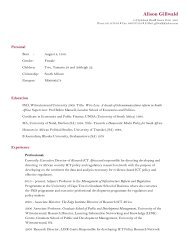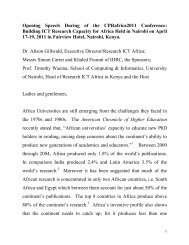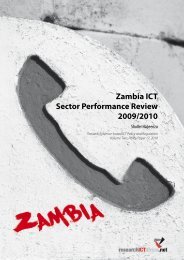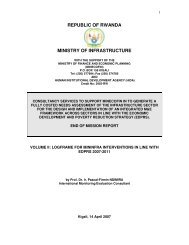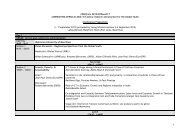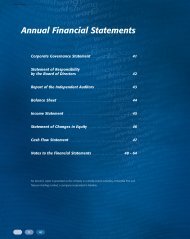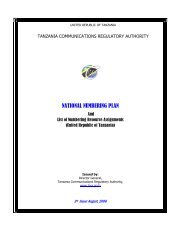Benin Telecommunications Sector Performance Review 2007
Benin Telecommunications Sector Performance Review 2007
Benin Telecommunications Sector Performance Review 2007
Create successful ePaper yourself
Turn your PDF publications into a flip-book with our unique Google optimized e-Paper software.
<strong>Benin</strong><br />
The improvement of teledensity requires action both on the part of the<br />
State and the fixed-network operator.<br />
Such actions include:<br />
The mobilisation of new investments with a view to extending and<br />
modernising existing networks.<br />
The development of rural telephony.<br />
The cutting of installation costs for a domestic line.<br />
GSM MOBILE TELEPHONY<br />
The adopted network standard in <strong>Benin</strong> is GSM. The adoption of a common<br />
standard is advantageous for clients because they are able to<br />
change operators without changing their telephone set. In addition, the<br />
adoption of GSM as the only standard prevents a standards war.<br />
Although telecommunications are still largely under State monopoly, the<br />
mobile phone sector was actually liberalised in 1997. In May 2000 GSM<br />
mobile telephony was launched and proceeded to develop rapidly. The<br />
GSM mobile phone sector as it currently exists in <strong>Benin</strong> does not have a<br />
long history. The services of the GSM mobile telephone market are currently<br />
provided by four operators, namely:<br />
Libercom<br />
Moov<br />
Areeba<br />
Bell Bénin Communications.<br />
LIBERCOM<br />
The original GSM operator in <strong>Benin</strong>, Libercom is a subsidiary of Bénin<br />
Télécoms SA. In 1999, the landline operator put in place an AMPS-type<br />
mobile network that was very successful. This success resulted in saturation<br />
that led to a drop in service quality. A <strong>Benin</strong>o-American partnership<br />
of the Build-Operate-Transfer (BOT) type enabled the establishment<br />
of the Libercom network, the first GSM-type telephone network in<br />
<strong>Benin</strong>. Libercom placed its maiden call on 17 April 2000 and launched its<br />
commercial operations in May 2000.<br />
At the end of July 2006 the number of Libercom subscribers stood at 76<br />
550 of whom only 1 410 were post-paid subscribers. In the mid-term,<br />
Libercom plans to install a new network with support from the Chinese<br />
manufacturer ZTE. The project will increase the capacity of the Libercom<br />
network to 500 000 subscribers.<br />
MOOV BÉNIN<br />
Created by the Atlantique Telecom group, the Moov Bénin network<br />
entered the mobile telephony environment replacing the former Télécel<br />
network that was created in December 1997. Moov is a big mobile telephony<br />
African group formed by the Moov networks in <strong>Benin</strong>, Burkina Faso,<br />
Côte d’Ivoire, the Central African Republic, Gabon, Niger and Togo. Moov<br />
Bénin is a business corporation with a capital of CFAF1 437 000 000. The<br />
commercial operations of Moov Bénin (former Télécel) were launched on<br />
10 July 2000 with the objective of growing mobile telephony. Moov<br />
equipped itself with modern and advanced technology enabling subscribers<br />
to call with an excellent radio quality and a fluid and easily<br />
accessible communications network. Since its inception, the network<br />
22 <strong>2007</strong> <strong>Telecommunications</strong> <strong>Sector</strong> <strong>Performance</strong> <strong>Review</strong>



